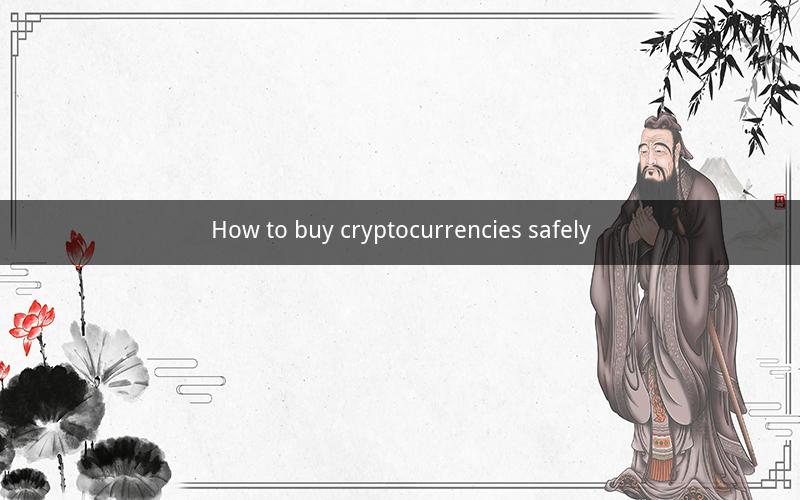
Directory
1. Introduction to Cryptocurrencies
2. Understanding the Risks
3. Researching Exchanges and Wallets
4. Verifying Identity
5. Security Measures
6. Keeping Your Funds Safe
7. Best Practices for Buying Cryptocurrencies
8. Top Cryptocurrency Exchanges
9. Frequently Asked Questions
10. Conclusion
1. Introduction to Cryptocurrencies
Cryptocurrencies have become a popular asset class in recent years. They offer individuals a decentralized and secure way to store value and make transactions. Before diving into the process of buying cryptocurrencies safely, it is important to have a basic understanding of what they are and how they work.
2. Understanding the Risks
While cryptocurrencies offer numerous benefits, they also come with inherent risks. It is crucial to be aware of these risks and take appropriate measures to protect your investments. Some of the common risks include market volatility, security breaches, regulatory changes, and technical issues.
3. Researching Exchanges and Wallets
The first step in buying cryptocurrencies safely is to research reputable exchanges and wallets. An exchange is where you will buy and sell cryptocurrencies, while a wallet is where you will store your digital assets. It is important to choose a platform that offers robust security features and has a good reputation within the community.
4. Verifying Identity
Many exchanges require users to verify their identity to comply with regulatory requirements and prevent fraudulent activities. This process typically involves providing personal information and possibly undergoing a verification process. It is essential to complete this step to ensure that your account is secure and that you can access your funds when needed.
5. Security Measures
Security is paramount when dealing with cryptocurrencies. Here are some key security measures to consider:
- Use strong, unique passwords for your accounts.
- Enable two-factor authentication (2FA) to add an extra layer of security.
- Be cautious of phishing attempts and only provide your personal information on secure websites.
- Keep your private keys safe and do not share them with anyone.
6. Keeping Your Funds Safe
Once you have purchased cryptocurrencies, it is crucial to keep them safe. Here are some tips to help you do so:
- Use hardware wallets for the highest level of security.
- Consider cold storage solutions if you have a large amount of cryptocurrency.
- Regularly backup your digital assets to prevent loss due to hardware failures or theft.
- Stay informed about the latest security threats and take appropriate actions to mitigate risks.
7. Best Practices for Buying Cryptocurrencies
When buying cryptocurrencies, there are several best practices to follow:
- Start with a small amount to test the waters and learn the process.
- Conduct thorough research on the cryptocurrency you are interested in.
- Be wary of scams and only use reputable sources for buying and selling cryptocurrencies.
- Keep your investments diversified to mitigate risk.
8. Top Cryptocurrency Exchanges
Several cryptocurrency exchanges have gained popularity due to their reliability and user-friendly interfaces. Some of the top exchanges include:
- Coinbase
- Binance
- Kraken
- Bitfinex
- Gemini
Each exchange has its own set of features, fees, and security measures, so it is important to choose one that aligns with your needs and preferences.
9. Frequently Asked Questions
Q1: What is a cryptocurrency wallet?
A1: A cryptocurrency wallet is a software or hardware device that stores your private and public keys, allowing you to send, receive, and manage your digital assets.
Q2: How do I choose a cryptocurrency exchange?
A2: When choosing a cryptocurrency exchange, consider factors such as security features, fees, liquidity, user interface, and customer support.
Q3: Can I buy cryptocurrencies without verifying my identity?
A3: Many exchanges require identity verification to comply with regulatory requirements and prevent fraudulent activities. However, some platforms may offer limited services to unverified users.
Q4: How do I know if a cryptocurrency exchange is reputable?
A4: Look for reviews and ratings from other users, verify the exchange's security measures, and check if it is licensed and regulated by a recognized authority.
Q5: Are there any risks associated with cryptocurrency exchanges?
A5: Yes, there are risks associated with cryptocurrency exchanges, such as security breaches, market volatility, and regulatory changes. It is important to be aware of these risks and take appropriate measures to protect your investments.
Q6: What is the best way to store cryptocurrencies?
A6: The best way to store cryptocurrencies depends on your needs and preferences. Hardware wallets are considered the most secure option, while software wallets offer convenience and flexibility.
Q7: How can I avoid losing my cryptocurrency?
A7: To avoid losing your cryptocurrency, keep your private keys safe, regularly backup your digital assets, and stay informed about the latest security threats.
Q8: Are there any tax implications when buying cryptocurrencies?
A8: Yes, there are tax implications when buying and selling cryptocurrencies. It is important to consult a tax professional to understand your obligations and comply with applicable regulations.
Q9: Can I withdraw my cryptocurrency to my bank account?
A9: Many exchanges allow users to withdraw their cryptocurrencies to their bank accounts. However, this process may vary depending on the exchange and the country you are in.
Q10: How can I protect myself from phishing attacks?
A10: To protect yourself from phishing attacks, be cautious of emails, messages, or websites that request your personal information. Always verify the legitimacy of the source before providing any sensitive data.
10. Conclusion
Buying cryptocurrencies safely requires thorough research, due diligence, and adherence to best practices. By following the steps outlined in this article, you can minimize the risks and maximize the benefits of investing in cryptocurrencies. Always stay informed about the latest developments in the cryptocurrency market and take appropriate actions to protect your digital assets.